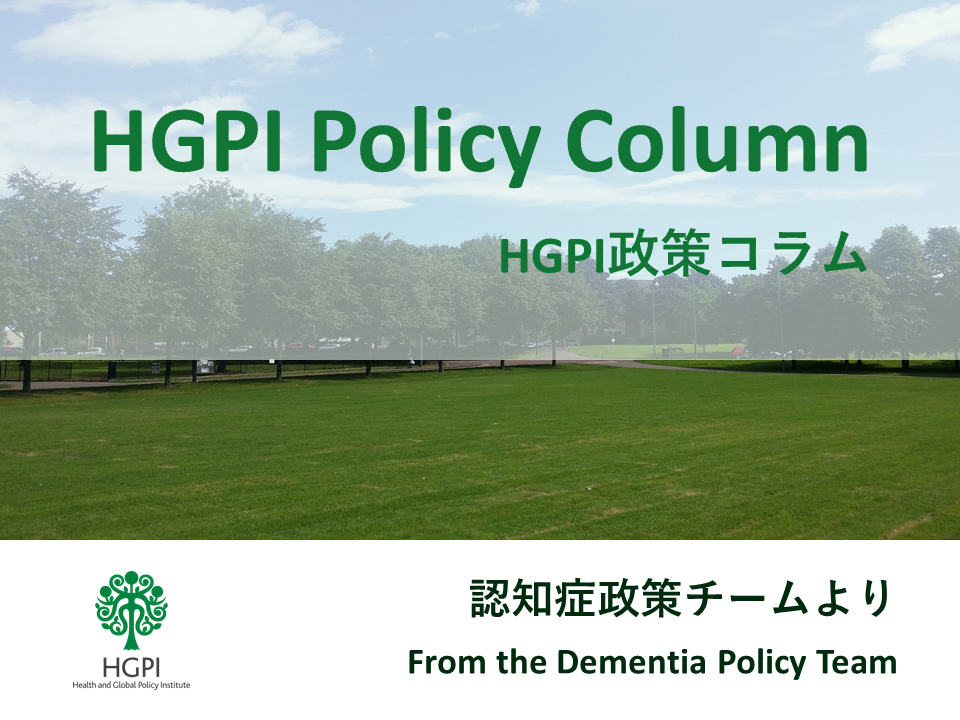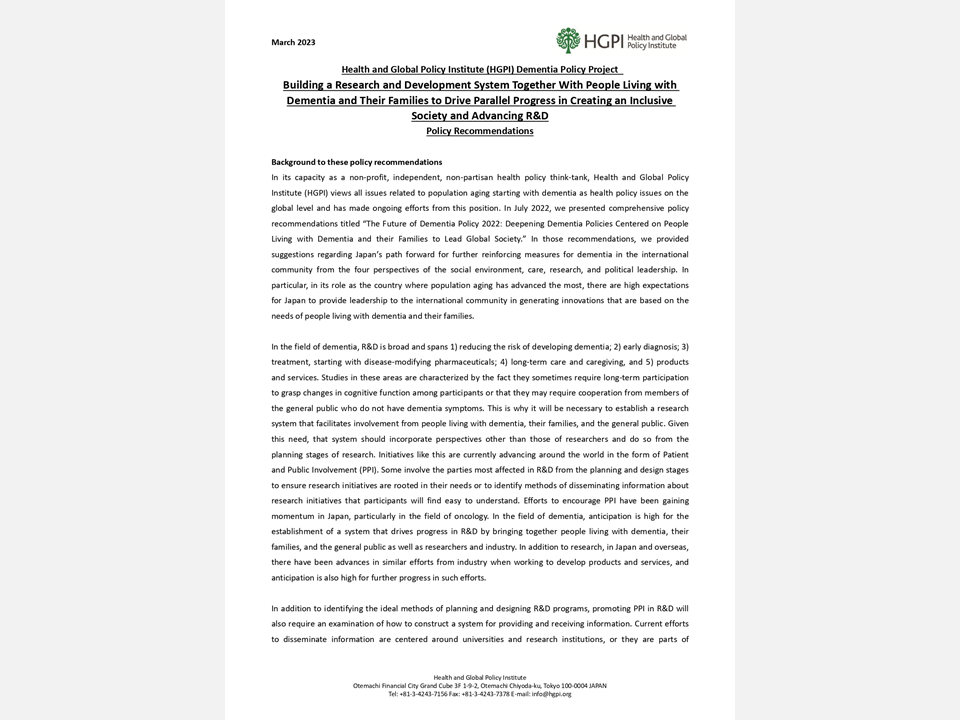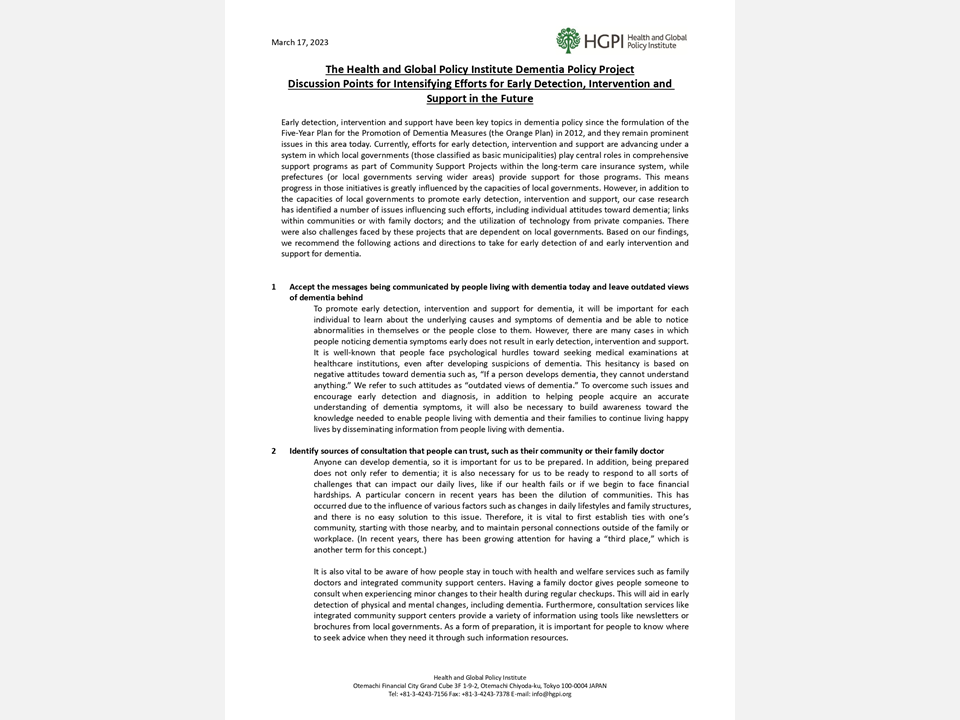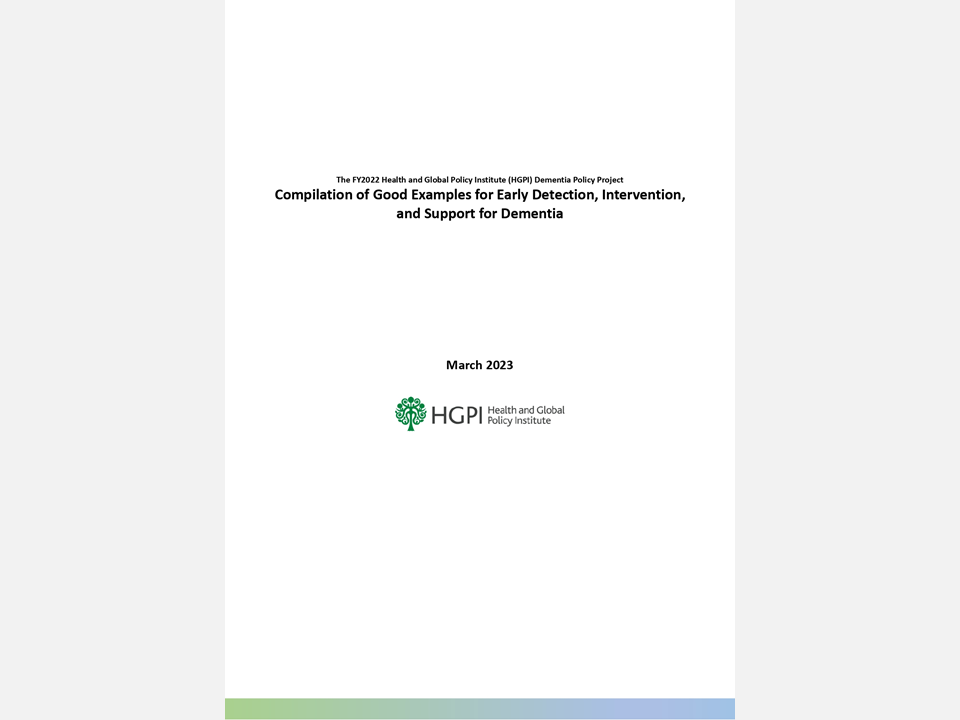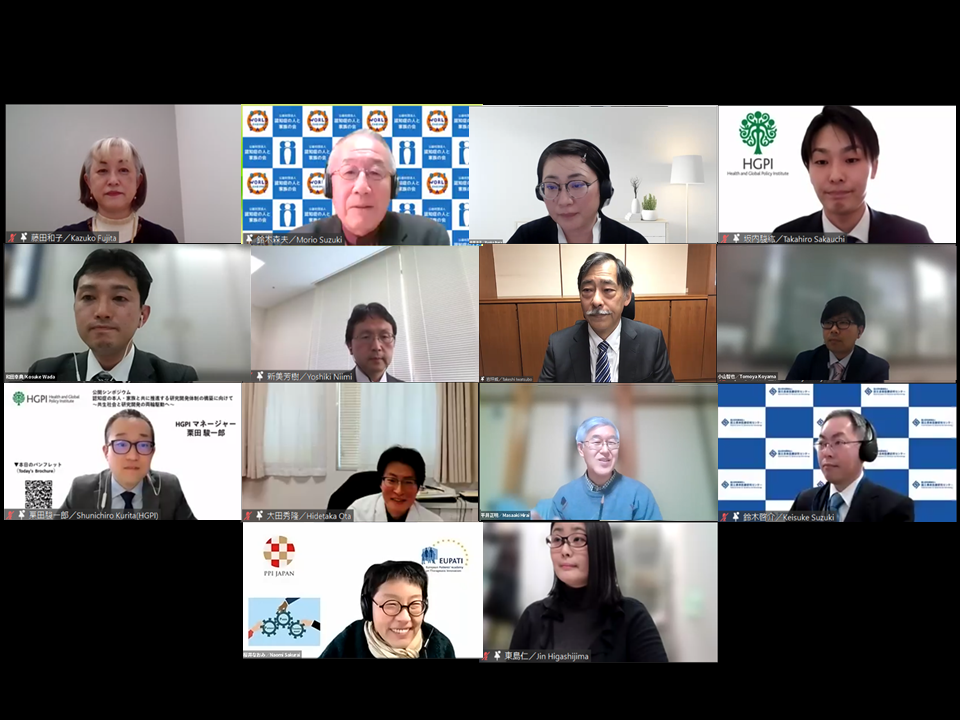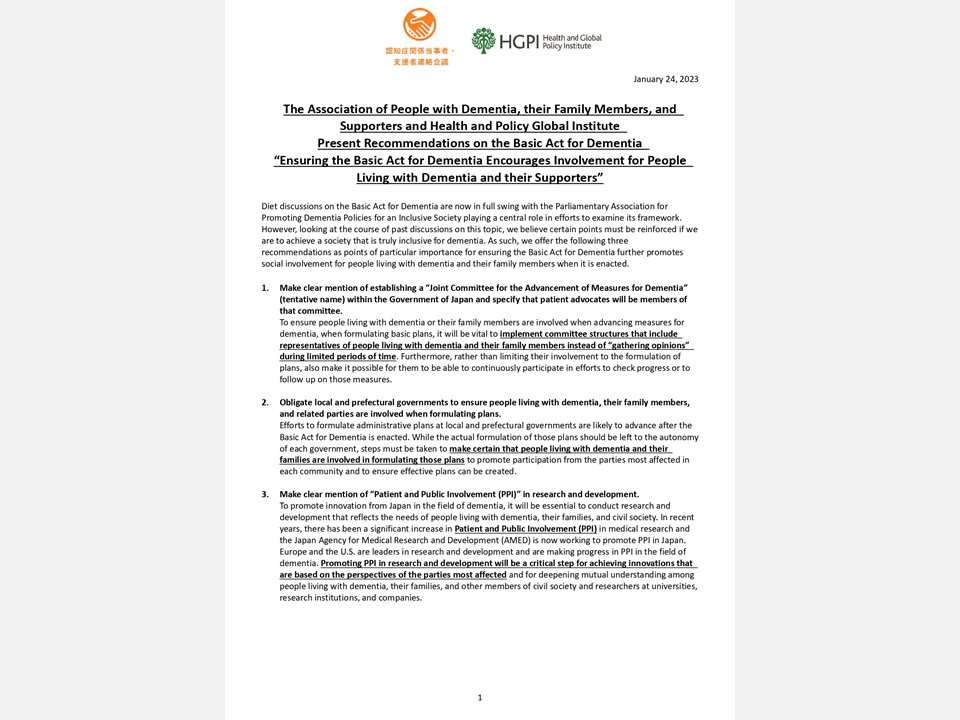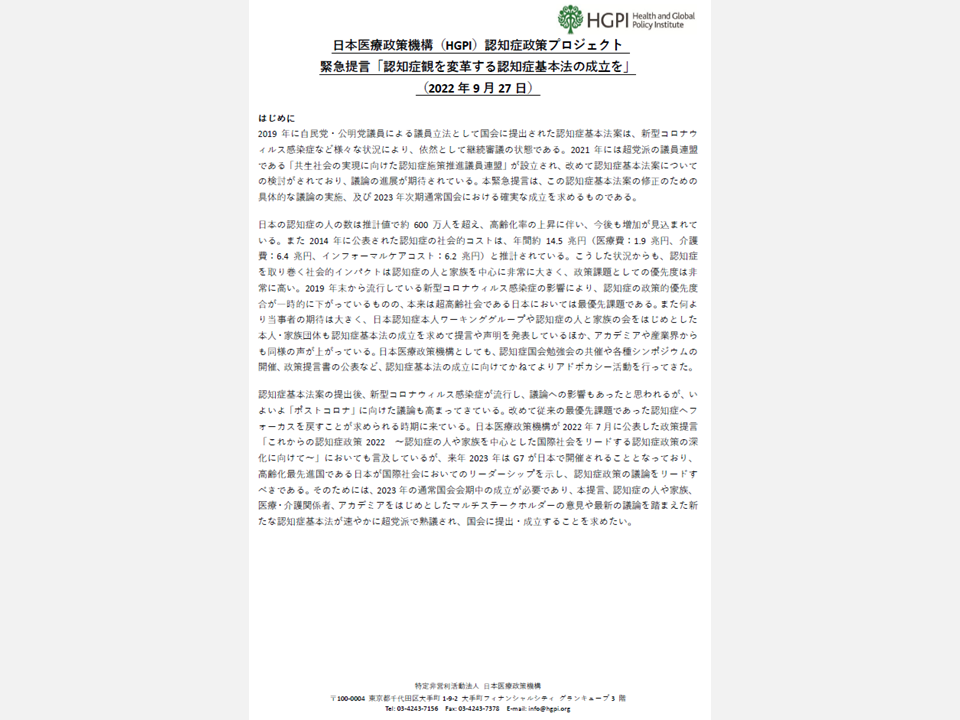[HGPI Policy Column] No. 36 – From the Dementia Policy Team – Commemorating the Approval of the Basic Act on Dementia: An Overview of the Act and a Look Back on HGPI’s Recommendations
date : 6/14/2023
Tags: Dementia, HGPI Policy Column
![[HGPI Policy Column] No. 36 – From the Dementia Policy Team – Commemorating the Approval of the Basic Act on Dementia: An Overview of the Act and a Look Back on HGPI’s Recommendations](https://hgpi.org/en/wp-content/uploads/sites/2/column-36-top.png)
<POINTS>
- The “Basic Act on Dementia to Promote an Inclusive Society” was approved on June 14, 2023.
- A joint bill for the Basic Act on Dementia was submitted by the Liberal Democratic Party and Komeito in 2019, but it was not approved. A non-partisan parliamentary group was established in 2021 to review its content.
- Health and Global Policy Institute (HGPI) has actively worked for the enactment of the Basic Act on Dementia by offering policy recommendations and engaging in advocacy activities. Those efforts have contributed to the law’s emphasis on creating an inclusive society and encouraging Patient and Public Involvement (PPI).
After a House of Councillors decision made on June 14, 2023, the “Basic Act on Dementia to Promote an Inclusive Society” (tentative translation; hereinafter, the “Basic Act on Dementia”) has been approved. Through its Dementia Policy Promotion Project, Health and Global Policy Institute (HGPI) has worked for the enactment of the Basic Act on Dementia for several years through efforts that have included holding multi-stakeholder discussions on this Act, holding study sessions within the legislature, formulating a number of policy proposals, and engaging in advocacy activities. While providing an overview of the Basic Act on Dementia, this column will compare the Act with HGPI recommendations and a bill that was submitted by the Liberal Democratic Party (LDP) and Komeito in 2019 and identify what changes have been made. We will also consider future challenges when carrying out the Basic Act on Dementia after its enactment.
Overview of the proposed Basic Act on Dementia
(Please note that the following is a provisional translation provided by HGPI for the purposes of this column.)
- Purpose
The purpose of this Act is to promote measures for dementia in a comprehensive and systematic manner so people with dementia can live with hope and dignity and to create an inclusive and vibrant society in which all citizens, including people with dementia, can live together harmoniously with mutual support and respect for each person’s personality and individuality while fully displaying their individuality and abilities.
- Basic Principles
Measures for dementia shall be implemented under Basic Principles (i) to (vii) to enable people with dementia to be able to live with hope and dignity.
(i) In their capacities as individuals with basic human rights, all people with dementia are to be enabled to pursue daily and social lives in accordance with their own intentions.
(ii) Citizens are to be able to obtain correct knowledge regarding dementia and deepen understanding toward people with dementia, which are necessary elements for promoting the creation of an inclusive society.
(iii) Through the elimination of obstacles that hinder daily life and social living for people with dementia, all people with dementia are to be able to lead safe, secure, and independent lives in their communities as equal members of society and to fully display their individuality and abilities through guaranteed opportunities to express themselves on matters that directly relate them and to participate in activities in all areas of society.
(iv) High quality, appropriate healthcare and welfare services are to be provided in a seamless manner while fully respecting the wishes of people with dementia.
(v) Support is to encompass parties surrounding people with dementia such as family members and other people close to them so they can enjoy peace of mind in everyday life in their communities.
(vi) Research and other endeavors that contribute to the creation of an inclusive society are to be promoted and an environment is to be fostered in which the broader public can benefit from the results of research and other efforts based on scientific knowledge regarding methods for prevention, diagnosis, treatment, rehabilitation, and long-term care related to dementia and mild cognitive impairment; in which opportunities for social involvement are provided so people with dementia can live with dignity and hope; and in which there is a social climate where people with dementia and other people can provide mutual support and coexist.
(vii) Comprehensive initiatives are to be undertaken in education, community development, employment, health, medicine, welfare, and related fields.
- Responsibilities, etc. of the national Government and local governments
The national Government and local governments are responsible for the formulation and implementation of measures for dementia pursuant to the basic principles.
Citizens shall endeavor to contribute to the creation of an inclusive society by obtaining accurate knowledge regarding dementia and a correct understanding toward people with dementia to promote the creation of an inclusive society.
The Government shall take legislative, financial, and other measures necessary to implement measures for dementia.
(The Act also describes the responsibilities of other parties such as healthcare and welfare service providers and services providing infrastructure for daily living.)
- The Basic Plan for the Promotion of Policies for Dementia, etc.
The Government shall formulate a Basic Plan for the Promotion of Policies for Dementia (after gathering opinions from the stakeholder committee that includes people with dementia, their family members, and others close to them).
Each prefectural and municipal government is obligated to endeavor to formulate its own prefectural/municipal plan (after gathering opinions from people with dementia, their families and others close to them).
- Basic Policies
(1) Promoting public understanding toward people with dementia, etc.
Policies that enable the public to obtain correct knowledge regarding dementia and a correct understanding toward people with dementia to promote the creation of an inclusive society
(2) Promoting the creation of barrier-free environments in the daily lives of people with dementia
Policies for promoting the creation of safe communities where people with dementia can lead independent lives alongside others and with peace of mind
Policies to enable people with dementia to maintain independent daily and social lives
(3) Securing opportunities for social participation for people with dementia, etc.
Policies that allow people with dementia to live with purpose and hope
Policies that allow people with early-onset dementia (people who develop dementia before age 65) and other people with dementia to maintain employment according to their intentions and abilities, or that contribute to smoother employment, etc. for such people
(4) Providing people with dementia with decision-making support and protecting their rights and interests
Policies that provide appropriate decision-making support among people with dementia and protect their rights and interests
(5) Establishing healthcare and welfare service provision systems, etc.
Policies to enable people with dementia to receive equitable and appropriate medical care according to their situations, regardless of where they live
Policies to provide people with dementia with high-quality, appropriate, timely, and seamless healthcare and welfare services
Policies to provide people with dementia with high-quality, appropriate healthcare and welfare services that are well-suited to the circumstances of each individual
(6) Establishing consultation systems, etc.
Policies to establish the necessary systems to provide people with dementia, their families, and related parties with consultation services that have the capacity to respond to various situations in a comprehensive manner while taking the circumstances of each individual into account
Measures to prevent isolation among people with dementia, their family members, and related parties
(7) Promoting research, etc.
Elucidating the underlying causes of dementia; conducting basic research on prevention, diagnosis, treatment, rehabilitation, and long-term care practices; disseminating results; etc.
Identifying effective approaches to social participation to enable people with dementia to live with hope and maintain dignity; conducting survey research for inclusivity and mutual support with other people that examines topics such as establishing social environments; utilizing research results, etc.
(8) Dementia prevention, etc.
Policies to enable willing participants to join initiatives for prevention that are based on scientific knowledge
Policies to promote early detection, diagnosis, intervention, and support
*Other measures include those for conducting the necessary surveys for formulating dementia policies, collaboration among various entities, support for municipal governments, and international cooperation
- Headquarters for the Promotion of Policies for Dementia
A Headquarters for the Promotion of Policies for Dementia shall be established in the Cabinet and be chaired by the Prime Minister. It will be responsible for drafting the Basic Plan for the Promotion of Policies for Dementia, promoting its implementation, and related actions.
*During the formulation of the Basic Plan for the Promotion of Policies for Dementia, the Headquarters shall establish a stakeholder committee that includes people with dementia, their family members, and other related parties and gather their opinions.
Comparing the approved Basic Act on Dementia with HGPI recommendations and the joint bill submitted in 2019
As discussed above, a joint Diet member’s bill for the Basic Act on Dementia was previously submitted by the LDP and Komeito in 2019. In particular, Komeito had been holding discussions on the need for a Basic Act on Dementia since around 2015. However, some items included in the 2019 bill had not been fully discussed and attracted various opinions from stakeholders. Then, the workload accompanying the Coronavirus Disease 2019 (COVID-19) pandemic response brought Diet discussions on the joint bill to a standstill.
Later, a nonpartisan parliamentary group called the Parliamentary Association for Promoting Dementia Policies for an Inclusive Society was established in June 2021 and full-scale discussions on the Basic Act on Dementia began anew after the 2022 Upper House election. Those discussions produced a new bill with interparty support less than one year later. It was submitted to the Diet after each party completed examinations of the bill in May and was then passed and enacted.
Regarding this Act, HGPI presented urgent recommendations in September 2022 and a joint proposal compiled with the Association of People with Dementia, their Family Members, and Supporters in January 2023. We also held media briefings and engaged in vigorous advocacy activities. While referring to some of HGPI’s recommendations, the following section will compare the recently-approved law and the 2019 bill to examine what changes were made.
(HGPI’s September 2022 recommendations)
Rather than “prevention,” the stated obligation of citizens should be to “Participate and cooperate in building an inclusive society”
(The 2019 bill)
Article 8 Citizens shall endeavor to obtain correct knowledge about dementia, to devote the necessary attention to the prevention of dementia, and to lend their cooperating in enabling people with dementia to be independent and participate in society.
(The approved Basic Act on Dementia)
Article 8 Citizens shall endeavor to obtain correct knowledge regarding dementia, to deepen understanding toward people with dementia needed to promote the creation of an inclusive society, and to contribute to the creation of an inclusive society.
(HGPI’s September 2022 and January 2023 recommendations)
Make clear mention of establishing a “Joint Committee for the Advancement of Measures for Dementia” (tentative name) within the Government of Japan and specify that patient advocates will be members of that committee.
(The 2019 bill)
There were no items related to this recommendation.
(The approved Basic Act on Dementia) *
Article 33 A Stakeholder Committee for the Promotion of Policies for Dementia shall be established at the Headquarters for the Promotion of Policies for Dementia to handle stipulated matters.
Article 34
(2) Members of the Stakeholder Committee for the Promotion of Policies for Dementia are to be appointed by the Prime Minister and shall include people living with dementia, their family members, or other related parties; parties engaged in duties related to health, medical care, or welfare for people with dementia; and other related parties.
*In the interest of brevity, some excerpts from this section have been partially modified by HGPI.
(HGPI’s September 2022 and January 2023 recommendations)
Clearly state the need for Patient and Public Involvement (PPI) in R&D
(The 2019 bill)
Article 20 The national Government and local governments shall promote basic and clinical research for the elucidation of the underlying causes of dementia; the development of methods to prevent, diagnose, and treat dementia, mild cognitive impairment, and other items that contribute to the prevention, etc. of dementia; the development of rehabilitation and long-term care methods tailored to individual conditions for people with dementia; and on other items that contribute to maintaining and improving quality of life for people with dementia; and shall implement policies to utilize the results of such efforts.
(2) When implementing measures described in the preceding paragraph, while promoting public-private collaboration, the national Government shall take necessary measures to establish an infrastructure for research and development for dementia including those for promoting efforts to conduct nationwide follow-up surveys and for establishing an environment in which clinical trials can be conducted rapidly and without difficulty.
(The approved Basic Act on Dementia)
Article 20 The national Government and local governments shall implement the necessary policies to promote basic and clinical research on items including the elucidation of the underlying causes of dementia, the development of methods to prevent, diagnose, and treat dementia and mild cognitive impairment, and the provision of rehabilitation and long-term care, and shall take measures to disseminate the results of such efforts.
(2) The national Government and local governments shall implement policies necessary to conduct and verify survey research and to utilize the findings of such research to identify effective methods of social participation so people with dementia can live with dignity and hope, to establish a social environment in which people with dementia and other people can provide mutual support and coexist, and for other related policies.
(3) While promoting public-private collaboration, the national Government shall implement necessary policies for an infrastructure for research, etc. that contributes to the creation of an inclusive society as well for promoting efforts to conduct nationwide follow-up surveys; for establishing an environment in which clinical trials can be conducted rapidly and without difficulty; for encouraging involvement from people with dementia, their family members, and other parties in said research, etc.; for establishing an environment for the deployment of the results of said research, etc.; and for establishing a foundation for the aggregation, management, and utilization of information pertaining to said research, etc.
(HGPI’s September 2022 recommendations)
“Early detection, diagnosis, and response” and “Establishing consultation systems” should be clearly stated as integral parts of the Basic Act on Dementia
(The 2019 bill)
Article 17 The national Government and local governments shall implement the necessary policies to promote the prevention of dementia and mild cognitive impairment including those for raising awareness and disseminating knowledge regarding prevention, for promoting activities in communities that are likely to contribute to prevention, and for gathering information on prevention.
(2) The national Government and local governments shall take necessary measures to promote early detection and response for dementia and mild cognitive impairment including those for the establishment of systems for cooperation and collaboration among Integrated Community Support Centers prescribed in Article 115-46, paragraph (1) of the Long-Term Care Insurance Act, health institutions, civil society organizations, and other organizations.
(The approved Basic Act on Dementia)
Article 21 The national Government and local governments shall implement the necessary policies to enable willing participants to engage in appropriate and scientifically sound activities for dementia and mild cognitive impairment through activities including those for raising awareness and disseminating knowledge regarding prevention, for promoting activities in communities, and for gathering information on prevention.
(2) The national Government and local governments shall take necessary measures to promote early detection, diagnosis, and response for dementia and mild cognitive impairment including those for the establishment of systems for cooperation and collaboration among Integrated Community Support Centers prescribed in Article 115-46, paragraph (1) of the Long-Term Care Insurance Act, health institutions, civil society organizations, and other related organizations, and for the provision of information related to dementia and mild cognitive impairment.
This concludes our examination of changes and comparisons among HGPI’s main recommendations for the Basic Act on Dementia, the 2019 bill, and the Act that was recently approved. Based on HGPI’s mission of “achieving citizen-centered health policy,” our recommendations have consistently focused on enacting a Basic Act on Dementia that emphasizes an inclusive society and encourages Patient and Public Involvement (PPI) in the policy formulation process and in R&D. Over the course of our continuous efforts to offer policy recommendations and engage in advocacy activities, we have obtained support for our recommendations from many related parties representing industry, Government, academia, and civil society and a great amount of understanding from members of the legislature.
While it is impossible for the recommendations of a single think-tank to be adopted as-is without being subject to adjustment over the course of the policy formulation process, I would like to point out our practice of advocating for content that matches our recommendations from multiple angles is one element that led up to the approval of the new Basic Act on Dementia.
Expectations and challenges for the future
At long last, the Basic Act on Dementia has finally been approved. While this is a development that stakeholders have hoped to see for some time, it does not mean we have crossed the finish line – rather, it is only the beginning. In addition to action from the Government, achieving the concepts set out by the Basic Act on Dementia will require all related stakeholders in industry, Government, academia, and civil society to continue taking action through their own initiative. To conclude this column, I would like to share expectations and challenges for the future in three discussion points.
• PPI in R&D
As mentioned above, HGPI has made a number of efforts to support PPI in R&D. In pursuit of this objective, we conducted a project throughout FY2022 titled “Building an R&D System Together with People Living With Dementia and Their Families – Driving Parallel Progress on an Inclusive Society and in R&D” and presented policy recommendations for that project in April 2023. (For more details, please see HGPI’s policy recommendations titled, “Building a Research and Development System Together With People Living with Dementia and Their Families to Drive Parallel Progress in Creating an Inclusive Society and Advancing R&D.” )
In the future, it will be necessary to build a platform for PPI in R&D that supports collaboration among researchers, research institutions, and people living with or affected by dementia and that disseminates information. I would like for HGPI to continue providing opportunities for discussions on specific methods of achieving this objective.
• PPI in the policy formulation process
The recently-approved Basic Act on Dementia obligates prefectural and municipal governments (including those of special wards) to endeavor to formulate plans for the promotion of dementia policies. We look forward to seeing an increase in the number of people living with dementia and their families involved in the policy-making processes at the national and local levels as a result of this law. However, surveys that HGPI has taken part in conducting in the past on local governments’ efforts to promote dementia policies have found that participation from people living with dementia in the policy-making process is lacking.
For example, in a questionnaire on basic plans focusing on dementia, among 61 municipalities who stated they “had formulated or were in the process of formulating basic plans,” 30 municipalities said they had no participation from people living with dementia in their processes to consider and formulate plans, while 18 municipalities replied that they had heard the opinions of people living with dementia indirectly from sources like Alzheimer’s Association Japan, local support organizations, and long-term care providers. (The Human and Community Development Laboratory, 2023. “FY2022 Elderly Healthcare Promotion Project – Survey and Research Report on Efforts to Reflect the Voices of People with Dementia in Municipal Policies,” p. 112)
Additionally, during the compilation of policy recommendations titled, “Further Promoting Patient and Public Involvement in the Policy-Making Process Steps for Achieving Healthcare Policies That Are Truly Centered on Patients and Citizens” presented by HGPI last year, PPI in the policy formation process was identified as a cross-cutting issue that impacts multiple diseases.
It is safe to say addressing this issue will require a number of initiatives from both administrative bodies and people living with or affected by dementia. In addition to establishing environments for PPI on the part of municipal governments that require it, those most affected must prevent the workloads of patient advocacy leadership from becoming concentrated on specific individuals, learn how to cooperate with other stakeholders and understand the policy formulation process, and deepen their understanding by learning about patient advocacy activities in other disease areas.
• Formulating prefectural and municipal plans for dementia
As noted above, the recently-approved Basic Act on Dementia obligates prefectural and municipal governments (including those of special wards) to endeavor to formulate plans to promote dementia policies, and this is something that also requires special consideration.
The Basic Policy on Economic and Fiscal Management and Reform 2022 establishes a new allocation of roles between the national Government and local governments. It states, “When the national government stipulates that local governments are legally obliged and delegated to formulate new plans, the guiding principles shall be to establish the minimum necessary requirements based on successive recommendations, etc., as well as provisions and notices mandating the best efforts feasible and, from the viewpoint of ensuring the autonomy and independence of local governments, to require as few new plans as possible and, even when truly necessary, the content and procedures for the plans are to be left as far as possible to the discretion of the local governments involved. Another principle will be to enable plans to be integrated with already formulated plans or to be jointly formulated with other local governments as long as there is no particular hindrance.”
As many municipalities currently include dementia measures as part of Insured Long-Term Care Service Plans or Insured Health and Welfare Service Plans for Senior Citizens, it will be necessary to adopt a waste-free approach to planning. It would be a reversal of priorities if municipalities end up copying their plans from other municipalities or place the formulation of such plans entirely within the hands of consulting companies simply for the sake of creating them. Patient advocacy organizations in each region may also be required to suspend planning activities in accordance with the principles laid out in the Basic Act on Dementia. In addition to being one tool that can prevent such situations from occurring, PPI may also be effective for ensuring that the unique philosophies of each municipality are prioritized in local regulations for dementia, which are a topic that will continue to be a focus of attention at HGPI.
This concludes our overview of the long-awaited Basic Act on Dementia, how recommendations from HGPI have been utilized, and issues that require consideration moving forward.
About the author
Shunichiro Kurita (HGPI Senior Manager; Steering Committee Member, Designing for Dementia Hub)
Top Research & Recommendations Posts
- [Policy Recommendations] The Path to a Sustainable Healthcare System: Three Key Objectives for Public Deliberation (January 22, 2026)
- [Research Report] Perceptions, Knowledge, Actions and Perspectives of Healthcare Organizations in Japan in Relation to Climate Change and Health: A Cross-Sectional Study (November 13, 2025)
- [Research Report] The 2025 Public Opinion Survey on Healthcare in Japan (March 17, 2025)
- [Policy Recommendations] Reshaping Japan’s Immunization Policy for Life Course Coverage and Vaccine Equity: Challenges and Prospects for an Era of Prevention and Health Promotion (April 25, 2025)
- [Research Report] The 2023 Public Opinion Survey on Satisfaction in Healthcare in Japan and Healthcare Applications of Generative AI (January 11, 2024)
- [Research Report] AMR Policy Update #4: Cancer Care and AMR (Part 1)
- [Policy Recommendations] Developing a National Health and Climate Strategy for Japan (June 26, 2024)
- [Public Comment Submission] “Assessment Report on Climate Change Impacts in Japan (Draft Overview)” (December 24, 2025)
- [Research Report] Survey of Japanese Physicians Regarding Climate Change and Health (December 3, 2023)
- [Research Report] The Public Opinion Survey on Child-Rearing in Modern Japan (Final Report) (March 4, 2022)
Featured Posts
-
2026-01-09
[Registration Open] (Hybrid Format) Dementia Project FY2025 Initiative Concluding Symposium “The Future of Dementia Policy Surrounding Families and Others Who Care for People with Dementia” (March 9, 2026)
![[Registration Open] (Hybrid Format) Dementia Project FY2025 Initiative Concluding Symposium “The Future of Dementia Policy Surrounding Families and Others Who Care for People with Dementia” (March 9, 2026)](https://hgpi.org/en/wp-content/uploads/sites/2/dementia-20260309-top.png)
-
2026-02-05
[Registration Open] (Webinar) The 141st HGPI Seminar “Current Status and Future Prospects of Korea’s Obesity Policy: Voices of People with Lived Experience in Policy Promotion” (March 3, 2026)
![[Registration Open] (Webinar) The 141st HGPI Seminar “Current Status and Future Prospects of Korea’s Obesity Policy: Voices of People with Lived Experience in Policy Promotion” (March 3, 2026)](https://hgpi.org/en/wp-content/uploads/sites/2/hs141-top-1.png)
-
2026-02-06
[Research Report] AMR Policy Update #5: Cancer Care and AMR (Part 2)
![[Research Report] AMR Policy Update #5: Cancer Care and AMR (Part 2)](https://hgpi.org/en/wp-content/uploads/sites/2/HGPI_20260204_AMR-Policy-Update-5.png)





